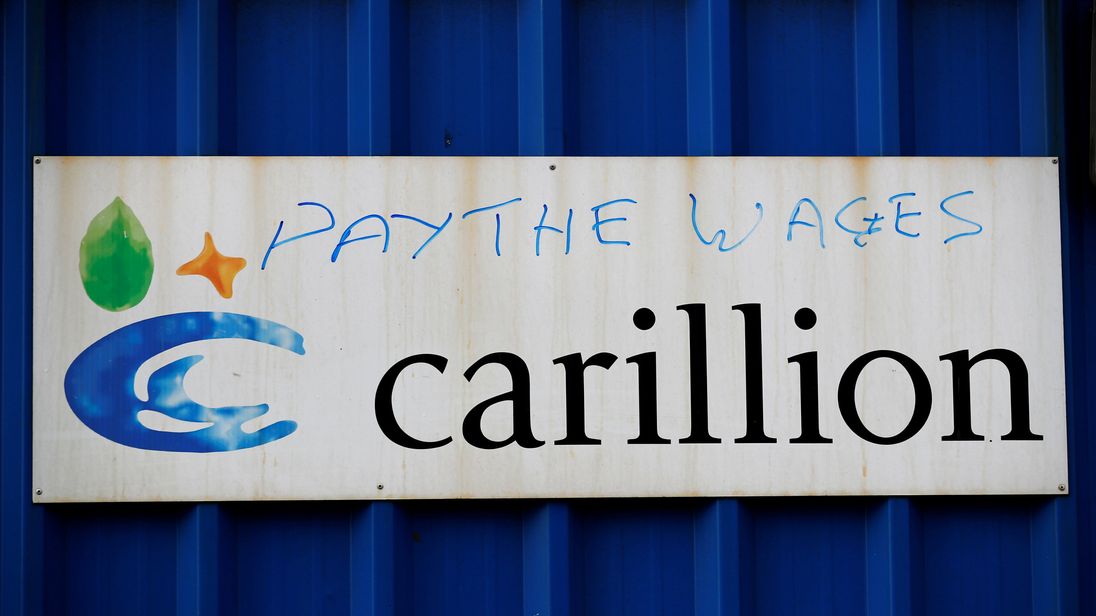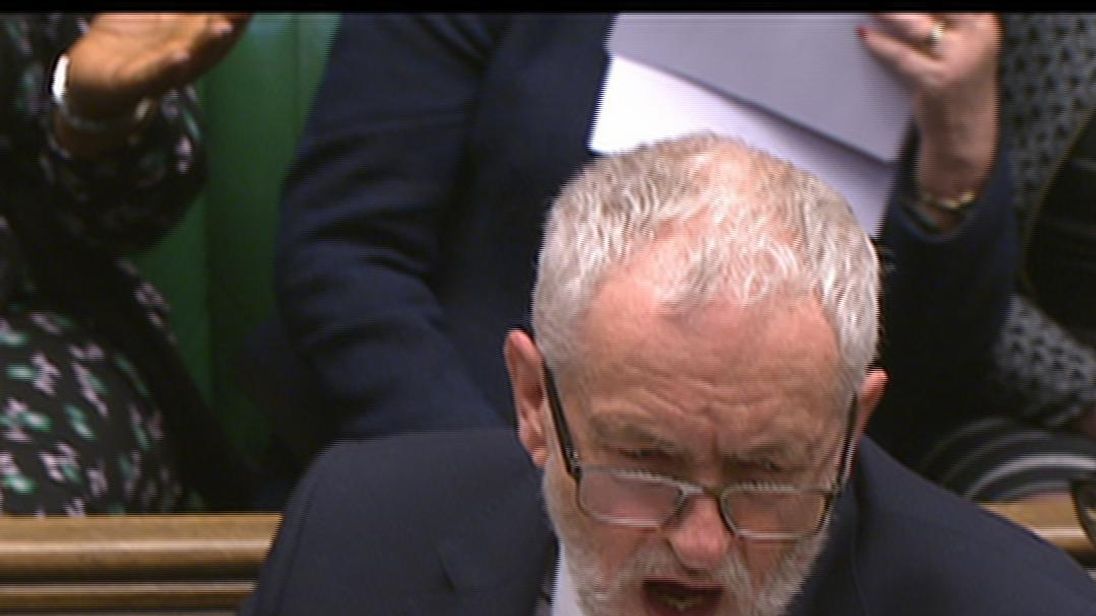Carillion, the bankrupt construction group, had financial liabilities worth about £5bn when it went bust this week, according to the most extreme calculation of its obligations to tens of thousands of pension scheme members.
Sky News can reveal that private analysis of Carillion's pension deficit on a Section 75 – or full buyout – basis has concluded that it was as high as £2.6bn, a far higher sum than the £587m accounting deficit referred to by its former chief executive in a High Court witness statement.
The £2.6bn figure relates to the cost to Carillion of paying an insurance company to guarantee all of its pension liabilities, and is significant because it is likely to be the sum claimed on behalf of the pension schemes as part of the liquidation process, according to insiders.
Sources said the full buyout deficit was also relevant because added to Carillion's other debts, including those owed to its banks, it takes Carillion's total financial obligations when it collapsed to roughly £5bn.
The vast scale of the company's total indebtedness further dwarfs its comparatively minuscule market capitalisation of just £61m when the Official Receiver was called in on Monday morning.
Although the pension schemes will lodge a claim for £2.6bn with the liquidator, there is no prospect of that money being paid, since Carillion failed with just £29m on its balance sheet.
:: What ultimately went wrong at Carillion
The Pension Protection Fund will now step in to provide compensation to 28,500 pension scheme members, with the total bill facing it likely to be up to £920m.
The PPF pays a reduced level of retirement benefits to workers of companies which become insolvent, compared to their original entitlement.
In addition to the £2.6bn Section 75 pension deficit, Carillion's liabilities when it went bust included £1.3bn owed to its banking syndicate; £350m arising from early payment facilities with suppliers; cross-guarantees of £630m relating to bonding facilities; £170m of convertible bonds guaranteed by the company; and an unknown debt to Her Majesty's Revenue and Customs, £16m of which was due by the end of the month.

The size and complexity of Carillion's balance sheet are likely to be among the factors investigated during a multitude of probes into the conduct of the company's directors and auditors.
Greg Clark, the Business Secretary, has ordered the Insolvency Service to fast-track an inquiry into the Carillion crisis, while the Financial Reporting Council has been asked to examine the work of KPMG, the company's auditor, and individual members.
Ministers have scrambled since Carillion's collapse to exert a grip on its fallout, with fears for tens of thousands of subcontractors caught up in one of the biggest disasters to hit a major UK industrial group for decades.
While Parliament's Liaison Committee, a consortium of all select committee chairs, was the latest to announce its own inquiry.
Labour MP Frank Field, who chairs the work and pensions committee, said: "I will be proposing we take evidence from the company directors, the trustees, the pensions regulator and the auditors who somehow concluded Carillion was a going concern."
News of the much-larger financial liabilities for Carillion comes days after Keith Cochrane, its interim chief executive, disclosed in a legal statement that the taxpayer-backed Royal Bank of Scotland (RBS) had tightened the terms of its funding to Carillion three days before it was forced to call in liquidators.
:: The key personnel at Carillion
Mr Cochrane, who has yet to speak publicly about the collapse of the company he had been in charge of since a profit warning sent its shares tumbling last July, accused RBS in his statement of taking "unilateral action which in the company's view undermined the group's efforts to conserve cash".

According to Mr Cochrane, RBS informed Carillion last Friday that it wanted the company to pre-fund supplier payments made through the bank, which meant it would need to make those payments two days earlier than cashflow forecasts had assumed.
He said this negatively impacted Carillion's liquidity by between £2m and £20m.
Santander UK, another member of the committee of Carillion's biggest lenders, was also criticised by Mr Cochrane for causing panic among the lending syndicate on 21 December by writing to the construction giant's suppliers notifying them of immediate changes to an Early Payment Facility (EPF) with the bank.
The interim chief's statement details the increasingly frenetic nature of efforts to secure financial support from the Government, the taxman and its lenders in the months before its collapse.
More from Carillion
Its failure has left 19,500 UK staff fearing for their jobs and uncertainty about the viability of a number of major public sector projects, emboldening the Labour leader Jeremy Corbyn to declare that private companies should be stripped of Government contracts.
A spokesman for Carillion's pension trustees declined to comment on Friday.
[contf] [contfnew] 
Sky News
[contfnewc] [contfnewc]





